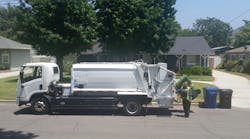BYD announced that it just completed battery-electric refuse truck demonstration project with the Los Angeles Sanitation (LASAN) department and Wayne Engineering. According to BYD, this demonstration logged more than 5,200 miles and drove up to 108 miles per day, with an average range of 99 miles.
LASAN ran a four-month pilot project with a class-six battery-electric refuse truck developed by BYD and Wayne Engineering. The demonstration began in January 2017, with the truck operating on the same real-world routes and variable terrain as LASAN’s regular trucks. The vehicle delivered up to four tons per day to the landfill, all on a single charge, with no major mechanical or performance issues.
“BYD set out to prove that our battery-electric refuse trucks reliably achieve 100 miles of range in everyday operating conditions, and we achieved that goal with a record-breaking 99 miles per charge over a four month timeframe,” said Macy Neshati, senior vice president of BYD Heavy Industries, in a statement.
“This demonstration with LASAN proves to other municipal refuse fleets that electrification is possible today," she added. "Additionally, these battery-electric trucks can provide significant operational cost savings."
Ron Cole, fleet manager for the LASAN, nited in a statement that, "as stewards of the environment, LASAN always looks forward to opportunities for testing and evaluation of new technologies that will help minimize our carbon footprints and other environmental impacts. We worked closely with BYD during the testing to ensure the electric vehicle met our operational requirements and the outcomes of the testing are satisfactory. This will pave the path for LASAN to move to zero emission collection fleet as part of Los Angeles Mayor Eric Garcetti's Sustainability plan."
“We’ve been designing and manufacturing innovative equipment for the waste management sector for half a century, and that has all been a buildup to this project with BYD and LA Sanitation, bringing cutting edge electric technology to refuse hauling, which can easily be a zero-emission operation,” added Kevin Watje, CEO of Wayne Engineering.



